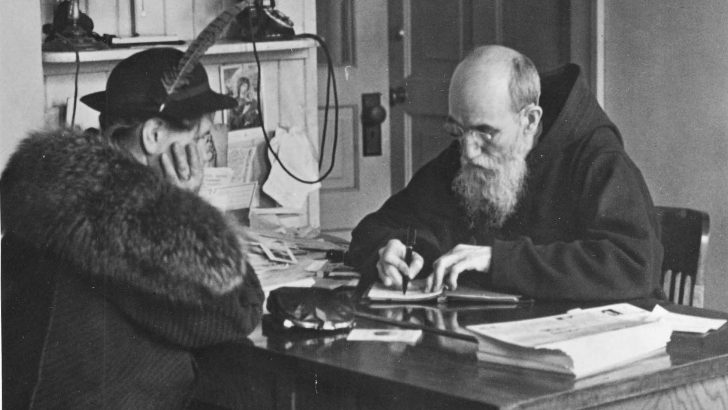Susan Gately writes on the Capuchin doorkeeper who teaches us ‘I can’t do everything but I will do what I can’.
The Irish heritage of a Capuchin priest beatified last weekend in Detroit made him who he was, according to Fr Tom Betz OFM Cap., St Augustine, Pittsburg’s Capuchin Provincial Minister. Fr Betz was speaking of Fr Solanus Casey, whose parents emigrated to the United States from Ireland in the aftermath of the Great Famine.
The Mass in Detroit’s Ford Field Stadium was concelebrated by 500 priests before a congregation of some 65,000 people, including some who believed they were cured through his intercession. Among these was Paula Medina Zarate, a retired schoolteacher from Panamá whose skin disease was healed just hours after praying at Fr Solanus’ tomb. During the ceremony, she carried a wooden cross-shaped reliquary containing bone relics removed from Blessed Solanus’ remains.
“Most people think the reason Fr Solanus Casey became a saint was because of his belief in the power of prayer. He stood for the fact that God does care for the prayers of you and me and he responds to them, but I have a different take on him,” Fr Betz told The Irish Catholic.
“He was a man who didn’t get to achieve his dreams as a priest. He was never allowed to hear confessions, he couldn’t preach at major Masses, he never held a position as a pastor or assistant pastor. But he didn’t complain. His attitude was ‘I can’t do everything but I will do what I can’.”
Born Bernard Francis Casey in 1870, Solanus was the sixth child in a family of ten boys and six girls born to Irish immigrant parents who left Ireland after the Famine.
Reunited
His father Bernard James Casey from Castleblaney, Co. Monaghan, emigrated aged 17, arriving in Boston in 1857. He met his wife-to-be Ellen Murphy when she was just 16.
They fell in love at first sight but Ellen’s family insisted they wait three years before marrying. The two separated, but through the help of a priest were reunited three years later and married.
Fr Solanus had a happy childhood in Wisconsin, steeped in Catholic tradition. The children loved sports and the boys formed their own baseball team. He recalled his father calling to them, “Prayer, boys, prayer!” From his mother – a native of Camlough, Co. Armagh – he gained a great love of the rosary.
With little education, he left home at 17, working as a lumberjack, a hospital orderly and a prison guard. Aged 21, he attempted to become a diocesan priest but his lack of German and Latin meant he could not continue. While praying for discernment before a statue of Our Lady, he heard her voice telling him “go to Detroit” – where the Capuchins had their headquarters.
Fr Solanus was ordained in 1904. Because of his perceived lack of theological education, he was a ‘simplex priest’ without ability to hear confessions or preach doctrinal sermons. For two decades, he served in a succession of simple roles in friaries in New York as sacristan and then as doorkeeper, answering the monastery door. It was here that Fr Solanus became a much-loved and sought-after counsellor. Sick people sought his blessing and “remarkable cures began to take place”, according to the official website for his Cause for Sainthood.
“Fr Solanus lived by faith. His person seemed to be surrounded by a supernatural halo. He always used to pray, above all in front of the tabernacle,” said Cardinal Angelo Amato, Prefect for the Vatican’s Congregation for the Causes of Saints, at the Beatification Mass.
Fr Benedict Groeschel – the founder of the Franciscan Friars of the Renewal who died in 2014 – recalled visiting the friary on a warm night and being unable to sleep. Around 3am, he took a walk and arrived at the chapel where he put on two lights and saw Fr Solanus kneeling on the top step of the altar.
Following his 20 years in New York, Fr Solanus lived at the St Bonaventure monastery in Detroit until 1945, again serving as a doorkeeper. He had great love for the sick and poor and fasted to give poor people his own lunch. “I have two loves: the sick and the poor,” he said. During the Great Depression of 1929, he started Detroit’s soup kitchen with the help of benefactors.
“One day there was no more bread and there was a long line of more than 200 people waiting for something to eat,” recounted Cardinal Amato. “Fr Solanus approached and began to recite the ‘Our Father’. A little bit later knocking was heard at the door and the baker appeared with a large basket of bread, and a truck-load of God’s gifts. When the people saw this, they began to cry with emotion. Fr Solanus simply stated: ‘See, God provides. No one will suffer want if we put our trust in Divine Providence’.”
In a congratulatory message on the Capuchin’s beatification, Armagh’s Archbishop Eamon Martin expressed the “joy of the Church in Ireland”.
“His beatification today is also a moment of great pride in the faith of those who have passed on to us a trust and belief in Jesus Christ,” he said.
Fr Solanus Casey died in Detroit in 1957 aged 86. His last words were: “I give my soul to Jesus Christ.”
Although he had been living away from Detroit for ten years, 20,000 people attended his funeral.


 Susan Gately
Susan Gately Blessed Solanus Casey, who was beautified during a Mass Nov. 18 at Ford Field in Detroit, records a note from a woman who visited him at St. Bonaventure Monastery in Detroit in 1941. The Capuchin Franciscan friar kept dozens of notebooks filled with prayer requests and favors from the thousands who visited him each year. Photo: CNS
Blessed Solanus Casey, who was beautified during a Mass Nov. 18 at Ford Field in Detroit, records a note from a woman who visited him at St. Bonaventure Monastery in Detroit in 1941. The Capuchin Franciscan friar kept dozens of notebooks filled with prayer requests and favors from the thousands who visited him each year. Photo: CNS 